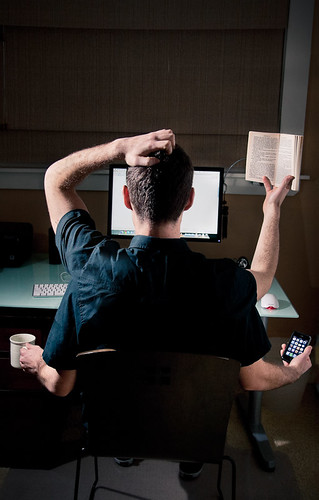Is our fear of terrorism rational?
uce Schneier, author of the excellent book Beyond Fear, points to two articles that sum it up: "Bee stings killed as many in UK as terrorists" During the 21st century, terrorism has been an insignificant cause of mortality in the United Kingdom. The annualised average of five deaths caused by terrorism in England and Wales over this period compares with total accidental deaths in 2010 of 17,201, including 123 cyclists killed in traffic accidents, 102 personnel killed in Afghanistan, 29…
1 min read
Here’s Why Stupid People Don’t Realize They’re Stupid
know how skilled you are at something, you need to watch yourself, watch others and compare. If you don't have the experience (or the mental firepower) to do this effectively, your judgements won't be accurate. To oversimplify it a tad -- stupid people may be too stupid to realize they're stupid: Successful negotiation of everyday life would seem to require people to possess insight about deficiencies in their intellectual and social skills. However, people tend to be blissfully unaware of their…
3 minutes
What is the most harmful drug?
new system that ranks drugs on the basis of harm caused to both the user and others places alcohol as the most harmful drug, above heroin and crack. The scale, developed by drug experts led by Professor David Nutt of Imperial College London, is published online in The Lancet. And: The nine categories in harm to self are drug-specific mortality, drug-related mortality, drug-specific damage, drug-related damage, dependence, drug-specific impairment of mental function, drug-related impairment of mental functioning, loss of…
2 minutes
Science Says This Is A Fun Way You Can Get Better At Multitasking
rst, the bad news: your brain was never designed to multitask well: To put it bluntly, research shows that we can’t multitask. We are biologically incapable of processing attention-rich inputs simultaneously. Across the board multitasking lowers productivity: Our results show that multitasking is bad for productivity even if one is not concerned with average duration. Neither gender is better at it: We do not find any evidence for gender differences in the ability to multitask. But if multitasking doesn't work,…
2 minutes
How To Remember Anything, According To Research
e best way to pick a password or hiding spot you'll remember is to choose one quickly because you want something that will return to mind quickly: Via Why We Make Mistakes: The key to picking a good hiding place is hiding place is making a quick connection between the thing being hidden and the place in which it is hidden, says Alan Brown. Brown is a professor at Southern Methodist University who has studied where and how people hide…
3 minutes
5 New Ways To Feel More Powerful, Backed By Research
e military makes soldiers stand up straight for a reason; there's an implicit connection between posture and power that has been demonstrated time and time again. Want to increase confidence? Make yourself tougher? Stand up straight. Clench your fists. Gestures should be palm down. Know how to speak with power. Deepen your voice. Speak first. Speak often. Repeat yourself. Interrupt people. Don't laugh. Elevate yourself when standing. Sit in the center during meetings. Dress appropriately. It makes a difference. People…
1 min read
The Simple Thing That Can Dramatically Improve Your Life
end more time outdoors. Nature has a myriad of incredible positive effects that have demonstrated by research: Being out in nature reduces stress. Nature walks or even looking at pictures of nature improves memory. Flowers increase romantic feelings. Nature can even make you a better person. Can't be bothered to step outside? Even a potted plant has been shown to improve attention span and increase creativity in an office environment. You might be inclined to discount this. I know that…
1 min read
10 New Tricks To Improve Your Memory
search says these tips can boost your memory: Closing your eyes does improve recall of information. And trust your memory: double checking makes you trust your memory less and reduces how vivid your memories are. Gesture when taking in new information and take a nap after you learn new things. Bet on your ability to remember things. (This makes it fun too.) Pictures of car accidents! Looking at emotional photos after taking in information led to greater recall. Be curious.…
1 min read







